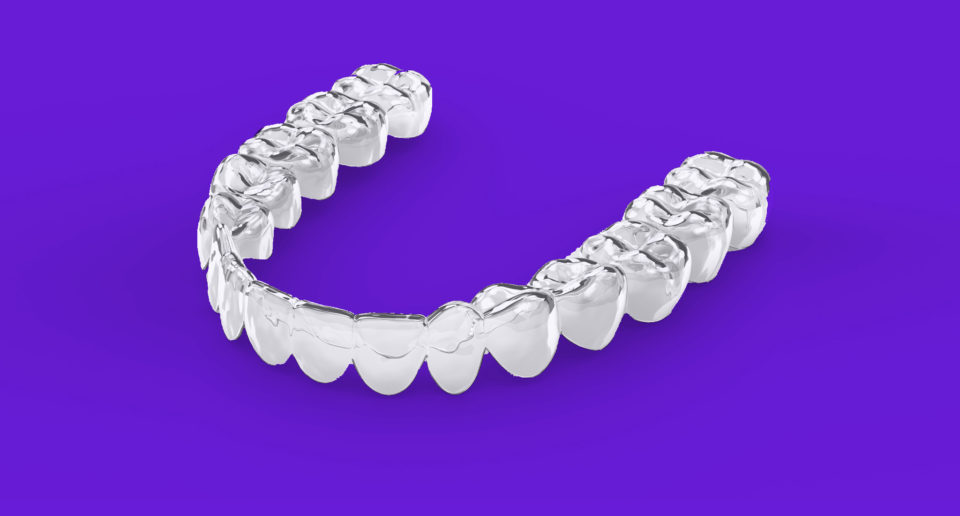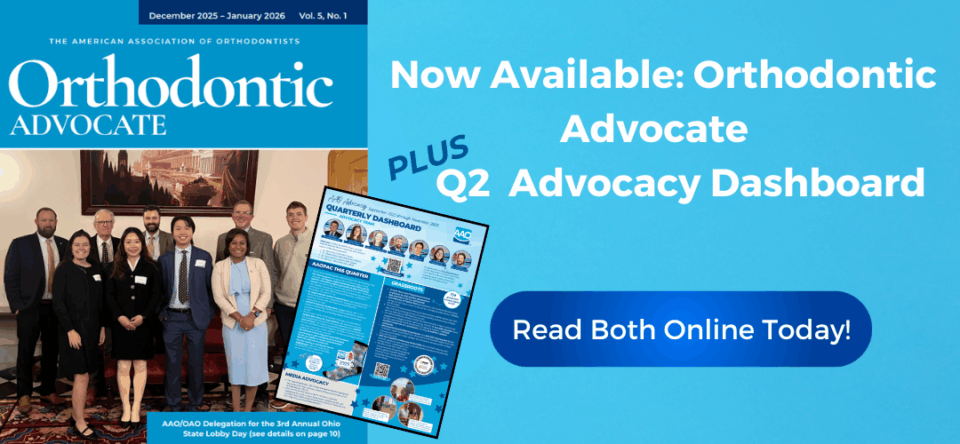April 18, 2019 — In late 2018, SmileDirectClub and Dr. D. Blaine Leeds (collectively “SmileDirectClub”) filed a lawsuit against the Board of Dental Examiners of Alabama (the “Board”) in federal court for the Northern District of Alabama. (See D. Blaine Leeds and SmileDirectClub v. Board of Dental Examiners of Alabama et al., Case No. 2:18-cv-01679-RDP.) The lawsuit arises out of a cease-and-desist letter sent to Dr. Leeds and SmileDirectClub by the Board after SmileDirectClub opened its first Alabama location in or around August of 2018.
On January 9, 2019, the American Association of Orthodontists filed a motion seeking permission to file an Amicus Curiae Brief (friend of the court brief) in Support of the Alabama Board’s Motion to Dismiss SmileDirectClub’s lawsuit; supporting the position of the Board and its members in the lawsuit; and in opposition to the claims and arguments made by SmileDirectClub and Dr. Leeds. The AAO has a significant interest in the outcome of the case as it involves the health, safety, and well-being of patients seeking orthodontic care. On January 11, 2019, the Court granted the American Association of Orthodontists’ Motion and allowed the American Association of Orthodontists to file its brief, which referenced alleged “Customer Complaints” regarding SmileDirectClub on the Better Business Bureau’s website – https://www.bbb.org/us/tn/nashville/profile/cosmetic-dentistry/smiledirectclub-0573-37111672. (The AAO’s Motion and Amicus Curiae Brief can be viewed here.)
On April 17, 2019, the Court entered an order on the Alabama Board’s Motion to Dismiss, and threw out six of SmileDirectClub’s counts against the Board:
[The Dental Board’s] motion [to dismiss] is GRANTED with respect to the following claims:
-
- All [of SmileDirectClub’s] claims against Defendant Board of Dental Examiners of Alabama are DISMISSEDWITHOUT PREJUDICE for lack of subject matter jurisdiction. The Clerk of Court is DIRECTED to terminate Defendant Board of Dental Examiners of Alabama.
- All [of SmileDirectClub’s] claims against Defendants Adolphus M. Jackson, T. Gerald Walker, Douglas Beckham, Stephen R. Sticklin, Mark R. McIlwain, Kevin M. Sims, and Sherry S. Campbell (the “Board members”) in their individual capacities are DISMISSED WITHOUT PREJUDICE for failure to state a claim.
- [SmileDirectClub’s] Equal Protection claims (Counts Five and Six) are DISMISSED WITH PREJUDICE for failure to state a claim.
- [SmileDirectClub’s] Substantive Due Process claims (Counts Seven and Eight) are DISMISSED WITH PREJUDICEfor failure to state a claim.
- [SmileDirectClub’s] Alabama Due Process claim (Count Nine) is DISMISSED WITHOUT PREJUDICE for lack of subject matter jurisdiction.
- To the extent [SmileDirectClub’s] claim for a declaratory judgment in Count Ten is based on a violation of Alabama law, it is DISMISSED WITHOUT PREJUDICE for lack of subject matter jurisdiction.
Defendants’ motion [to dismiss] is DENIED with respect to the following claims:
-
- [SmileDirectClub’s] Dormant Commerce Clause claims (Counts One and Two) against the Board members in their official capacities may proceed.
- [SmileDirectClub’s] section 1 Sherman Act claims (Counts Three and Four) against the Board members in their official capacities may proceed. (Emphases added).
Given the Court’s Order, other than SmileDirectClub’s count for injunctive relief, the remaining causes of action that SmileDirectClub and Dr. Leeds can legally continue to proceed with, although there have been no findings on the merits, are their Sherman Act and Dormant Commerce Clause claims against the Alabama Dental Board members in their official capacities (not their individual capacities). And even then, for SmileDirectClub’s Sherman Act claims the Court stated that “[f]urther factual development will be required to determine whether the Board members are entitled to . . . immunity. The Board members may therefore raise the . . . immunity defense at a later stage in this litigation, in a motion for summary judgment, if appropriate.” (p. 19) (emphases added). If the Court determines there is immunity, then the Sherman Act claims brought by SmileDirectClub and Dr. Leeds will fail as well.
The American Association of Orthodontists’ involvement as an amicus party, in the interests of the health, safety, and well-being of patients seeking orthodontic care, did not go unnoticed by the Court, which specifically referenced the American Association of Orthodontists in its Memorandum Opinion:
“. . . [SmileDirectClub and Dr. Leeds] cannot possibly mount a successful challenge to the Board’s regulation under the deferential rational basis standard, and their equal protection and substantive due process claims therefore necessarily fail. Defendants and their amicus [the American Association of Orthodontists] have identified several legitimate goals for requiring the physical presence of a licensed dentist at facilities where [a digital intra-oral scanner] is used. Using [a digital intra-oral scanner] to make digital images of teeth is an intraoral procedure that involves inserting the device into patients’ mouths. Hypothetical legitimate goals for requiring a dentist’s physical presence at facilities where [a digital intra-oral scanner] is used include: (1) ensuring proper sterilization procedures are followed to prevent the spread of illness; (2) ensuring that a skilled, trained dentist is available in the event of a sudden medical emergency caused by the [digital intra-oral scanner] inadvertently dislodging a patient’s crown; (3) ensuring that a licensed dentist has the opportunity to diagnose preexisting conditions that contraindicate the use of clear aligner therapy in the first place, such as gum disease; and (4) ensuring that a dentist can verify in real time that the [digital intra-oral scanner] is accurately capturing a patient’s oral cavity, to avoid having the procedure repeated and to prevent patients from receiving clear aligners that were fabricated based on inaccurate images.”
“All of these purposes are legitimate state interests that could justify the Board’s regulation. Moreover, a rational basis undoubtedly exists for believing that the regulation would further those hypothesized purposes. Rational arguments exist that requiring a licensed dentist to be physically present at facilities where [a digital intra-oral scanner] is used would advance each of the interests identified above. . . . (pg. 41).”
View the full Memorandum Opinion here.
The American Association of Orthodontists has also submitted an amicus brief in the Georgia lawsuit involving SmileDirectClub. See SmileDirectClub, LLC v. Georgia Board of Dentistry et al., Case No. 1:18-cv-02328 (N.D. Ga.).
Please note, every orthodontist (as a citizen of and licensed dental provider in his or her state) and orthodontic patient has the right, independently and individually, to express his or her opinion on any dental issue to his or her state dental board, the Food and Drug Administration (FDA), and elected officials (e.g. Attorney General, Governor, state representative, etc.). If you feel so compelled, you can look up and contact the appropriate entity. Contact information for state and provincial dental regulatory authorities can be found at https://www.aaoinfo.org/aao/state-dental-board-info.
About the American Association of Orthodontists
Founded in 1900, the AAO is the world’s oldest and largest dental specialty organization. It represents more than 19,000 orthodontist members throughout the United States, Canada and abroad. AAO member orthodontists have successfully completed an accredited orthodontic residency program, after previously graduating from dental school. As a professional organization, the AAO is dedicated to, among other goals: (a) ethically advancing the art and science of orthodontics and dentofacial orthopedics worldwide; (b) improving the health of the public by promoting quality orthodontic care, the importance of overall oral healthcare, and advocating for the public interest; and (c) educating the public about the benefits of orthodontic treatment and the educational qualifications of orthodontic specialists.
For more information visit aaoinfo.org, which includes the AAO’s “Questions to Consider When Researching Direct-To-Consumer Orthodontic Companies.” Comprehensive orthodontic treatment is a complex medical process, and the AAO has long held the position that it is in the best, and safest, interest of the public to have that treatment conducted under the direct and ongoing supervision of a licensed orthodontist.



